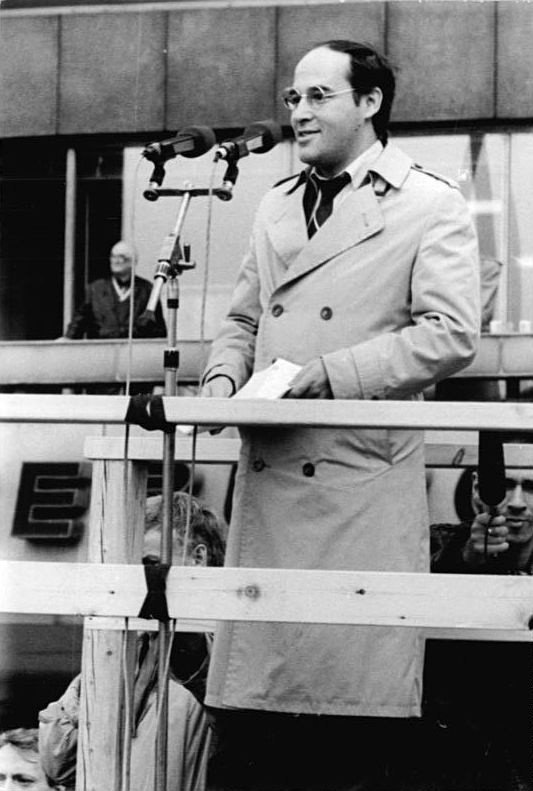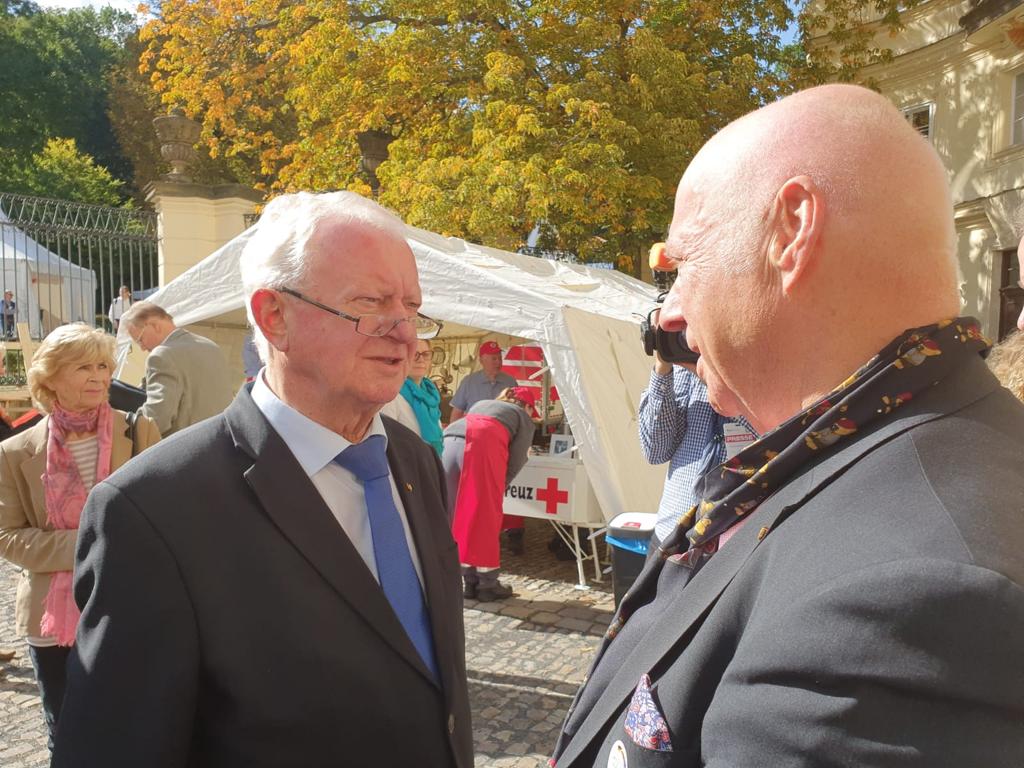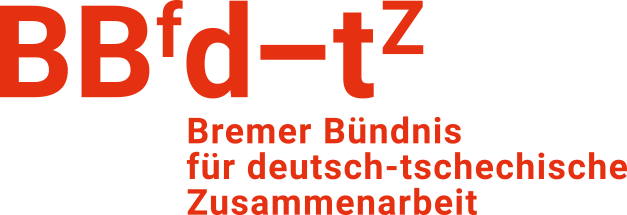

contemporary witnesses - to the individual pages
GDR and FRG
This exhibition not only deals with the perspectives of the refugees, but also looks at the experiences of the people who were politically involved in these events on both the Federal Republic and the GDR side. In the summer and fall of 1989, Gregor Gysi negotiated a possible return of the refugees to the GDR as a lawyer in the West German embassy in Prague together with his colleague Wolfgang Vogel. Some of the GDR citizens accepted this offer in return for leaving the country within the next six months. Rudolf Seiters, then Minister of the Chancellery, negotiated the GDR citizens’ departure alongside Federal Foreign Minister Hans-Dietrich Genscher.
Almost 32 years later, these politicians look back on the events surrounding the occupation of the Prague embassy.


Gregor Gysi at a demonstration, 1989.
Image: Bundesarchiv, Bild 183-1989-1104-042 / Link, Hubert / CC-BY-SA 3.0
Gregor Gysi
Gregor Gysi was born in Berlin in 1948. The politician, who is still active today, was one of the few independent lawyers in the GDR who also represented members of the opposition. He was instrumental in the reforms of the SED/PDS and is considered a central figure of the East German Autumn of 1989 in the GDR. Gysi accompanied the lawyer Wolfgang Vogel on his mission to the Prague embassy to persuade those seeking refuge there to return to the GDR.
What do you think about the "Republikflucht", the flight from the GDR, in general and in the fall of 1989 in particular?
I represented many people who had applied to leave the country because they wanted to travel from the GDR to West Germany. This was also due to the fact that they were generally not allowed to travel to the West, so they only had television images of the West. In this respect, I could very well understand that they wanted to leave for West Germany.
How did you react when you heard about the refugee movements to the Prague embassy?
When the embassy of the Federal Republic of Germany was occupied in Prague, I didn’t understand why the people concerned weren’t allowed to leave right from the start. The embassy continued to fill up and it became an international event.
Why did you and Wolfgang Vogel agree to persuade the refugees to return? What was the GDR leadership's mission behind this action?
The Minister of Justice summoned me and the lawyer Wolfgang Vogel was also present. Vogel said that he had permission for all GDR citizens to return to the embassy in order to subsequently obtain permission to leave for the Federal Republic of Germany. It would take a maximum of six months to leave the country. He even explained that this also applied to an officer of the NVA who was also staying at the embassy of the Federal Republic of Germany in Prague. However, as there were over 3,000 citizens in total, he would not be able to help them with their departure applications on his own. I then offered that one colleague in each of the 15 districts would take over the representation. He added that whenever he promised to leave the country, he always did so. This also applies here.
What did you think and feel when you met the people at the embassy? How did the people seeking refuge react to you? Did they trust you? Did you have to deal with hostility?
The staff at the German embassy had told the refugees that they could talk to lawyer Vogel. Not very many came. Those who did show up were made the offer. They then traveled to the GDR, were represented and their departure was approved. The fact that there were so few was also due to the fact that a period of six months was far too long. If it had been shortened to six weeks, perhaps more would have made use of the offer. Those who came also had confidence, while the others showed a certain mistrust by not showing up. I didn’t experience any hostility towards Wolfgang Vogel or myself there.
Did these events influence your relationship with the GDR? How do you assess the desperate act of these people to leave the GDR via Prague for the FRG?
I realized that the GDR had lost large sections of the younger generation. I had already said that many would have preferred to live in the other Germany. They must not have been desperate, they were young and felt far too cramped in the GDR.


Rudolf Seiters, first from left, at an anniversary celebration at the embassy.
Photo: Private/Hans-Joachim Weber
Rudolf Seiters
Rudolf Seiters was born in Osnabrück in 1937. From 1989 to 1991, he was Minister of the Chancellery in the Kohl cabinet. In this role, he played a key role in resolving the crisis in the Prague embassy alongside the then Foreign Minister Hans-Dietrich Genscher.
How did you assess the events in the federal government at the time?
After the Basic Treaty, the Chancellery was the GDR’s negotiating partner. I therefore paid an “inaugural visit” to Honecker on July 4. On August 8, I had to close the Permanent Representation in East Berlin due to overcrowding (117 refugees). Two days later, negotiations with representatives of the Politburo in East Berlin (without result). Closure of the German embassies in Prague, Warsaw and Budapest (AA). Constant negotiations with the Permanent Representative of the GDR Neubauer in Bonn, with RA Vogel, Schalck-Golodkowski and others. September 11th was helpful (Hungary opens the borders to Austria). The catastrophic economic situation in the GDR was helpful. I was able to promise financial aid, but it would not be forthcoming without a solution to the refugee situation (talks with Schalck-Golodkowski).
In addition, the 40th anniversary celebrations of the GDR were coming up at the beginning of October, and Gorbachev had signed up. The GDR could not want these days to be overshadowed by the emotional images from Prague. I was therefore firmly convinced that the GDR would give in before this date. So on September 29, Neubauer urgently requested a meeting, which then took place in my office in the Chancellery in the presence of Foreign Minister Genscher. He then flew with Genscher to Prague. The first stone was broken out of the wall there. But it was only in Dresden (December 19) that we were convinced: unity was coming.
What was the political guideline of the Federal Republic regarding the situation in the embassy?
There was agreement to enforce the freedom to leave the country and to emphatically help the refugees in their new life in the Federal Republic. An exodus was to be prevented. Hence (in February 90) the offer: The DM is coming.
